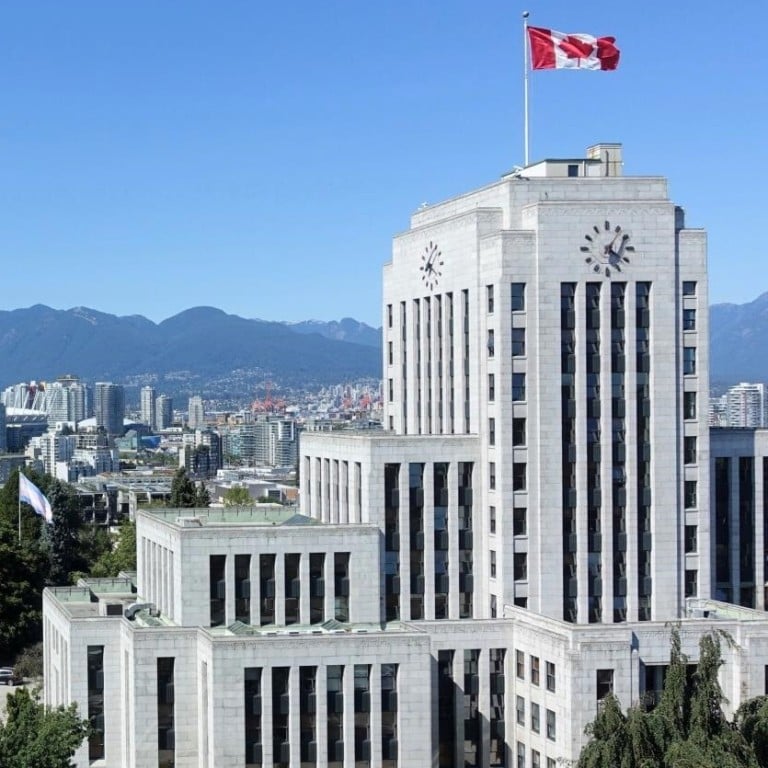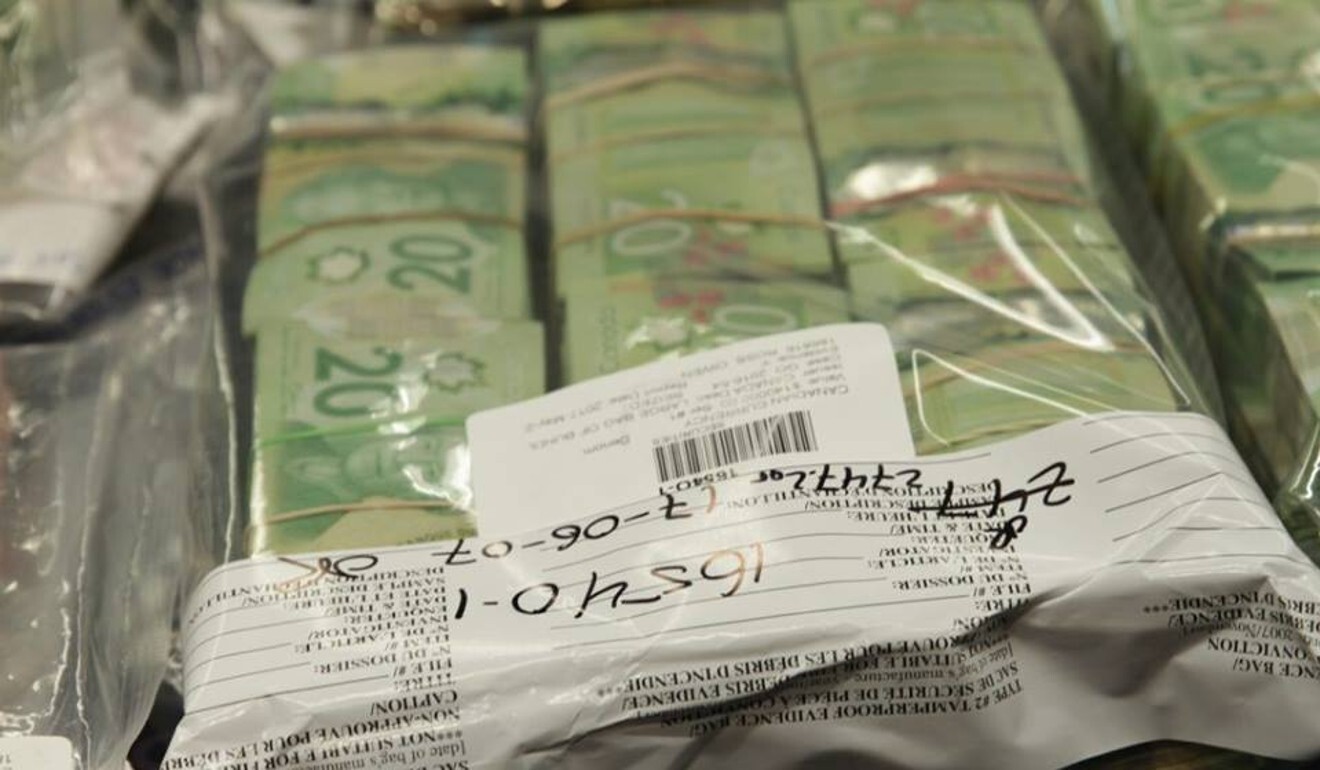
Someone paid a Vancouver city tax bill with C$47,700 in cash, before money-laundering fears triggered limits
- City Hall took millions in large cash transactions, including one tax payment that would have weighed 2.2kg in C$20 notes
- A councillor described encountering a man at City Hall with a shopping bag filled with stacks of money, who asked where to pay his taxes
Vancouver City Councillor Melissa De Genova was walking through the ground floor of City Hall, pushing her baby daughter in a stroller, when she was approached by a man carrying an open shopping bag, filled with bundles of cash.
“I could clearly see the money in it … it was stacked quite neatly,” she recalled.
Where could he pay his taxes, he asked the surprised politician.
De Genova said the incident in July 2018 wasn’t the first such scene she had witnessed at City Hall; on another occasion she had seen someone with a large stack of money in a fanny pack.
The unusual encounters would spur De Genova to put forward a motion to council in January 2019 calling on city staff to look into how to better combat money laundering. The motion, which cited concerns that cash payments to the city, which can be made anonymously, might be used as a laundering conduit, was passed unanimously and swiftly resulted in a ban on cash payments for city bills of C$10,000 (US$8,030) or more.
Now, documents released under a Freedom of Information request have shown just how much cash was being handed over the counter at City Hall.

In the nine years to January 2021, there were 1,905 payments greater than C$5,000 (US$4,015), totalling C$13.1 million (US$10.5 million), the documents show.
Vancouver woman sues for US$200,000 lost trying to get money out of China
They included individual payments as high as C$47,700 (US$38,300) – a sum that would weigh more than 2.2kg (nearly 5 pounds) in C$20 bills.
The release of the city documents to Coastal Front, a Vancouver media group that published them this week, comes amid scrutiny about the extent of money laundering in British Columbia.
A public commission into money laundering, headed by BC Supreme Court Justice Austin Cullen, recently concluded after more than two years of investigation and is due to issue its report to the provincial government by December 15.
What circumstances would there be pay to pay the city with such a large amount of cash?
It heard testimony about alleged dirty money being laundered through BC casinos, the luxury car market and the real estate industry, with the help of Chinese money smugglers and high roller gamblers, as well as Canadian banks.
Lewis Dyson, a producer with Coastal Front, said the FOI release – which took about a year for the city to fulfil – fleshed out anecdotal accounts by De Genova and others about large cash payments at City Hall.
The data did not prove nefarious activity, Dyson said.
“But it doesn’t look very good, does it?” he said. “What circumstances would there be to pay the city with such a large amount of cash?
“You can’t go to the bank and just take out that amount of money in one go … what reason would you have to do that instead of [using] a simple bank transfer or a cheque, an electronic transfer? What kind of person has that amount of money on hand?”
The Vancouver student, his luxury apartment, and 7kg of ‘drug money’
De Genova also noted that large cash payments did not necessarily indicate wrongdoing – but they presented a potential risk.
“We weren’t asking for ID. They could pay [property taxes] on any address they wanted. There was no accountability,” she said.
“I’m not saying all cash payments have issues or that they lead to money laundering. But if the City of Vancouver is going to speculate whether issues we face as a city, such as affordability, are due to money laundering, it’s important we don’t just point fingers, that we take steps for accountability ourselves.”
The biggest cash payments were for individual tax bills, including the C$47,700 payment received in 2014, and a payment of $44,463 (US$35,700) in 2017.
But hefty cash payments were also made for grave sites in the city-run Mountain View Cemetery, including payments of C$28,500 (US$22,880) and $25,960 (US$20,840) in 2016 and 2017 respectively.
Cash payments represent a tiny fraction of the city’s current C$1.6 billion (US$1.28 billion) annual revenue, 59 per cent of which comes from property taxes.
But the number and value of cash payments of C$5,000 or more grew steadily from 2012, when there were 118 such transactions worth a total of C$796,786 (US$639,620), until 2019, when there were 303 payments worth a total of C$2.091 million (US$1.68 million).
The 750 pages of FOI documents, which have been reviewed by the South China Morning Post, also include email discussions in 2013 among city staff about large cash payments.
I think it’s important [to] say that we’re not going to turn a blind eye … and that we require people to meet these requirements and show that we’re doing all we can to combat money laundering
Staff members were concerned that law enforcers might seek information about such payments, and that city procedures were “not sufficient to meet the reporting requirements for Fintrac”, the Canadian financial intelligence unit that is tasked with preventing money laundering, wrote Michael Tham, an accountant in the city’s finance risk and business planning department.
But the staff concluded that payments to the city did not need to be reported to Fintrac, Tham told Blair Choo, manager of collections and customer service.
People making large cash payments were not required to show identification, although staff “typically” asked for contact information from the payer and banked such payments individually “so that if there is an anomaly with the cash, we can isolate it”, wrote Tham.
Judges: CIBC bank supports clients who break China’s cash-export laws, to buy Vancouver homes
Cash payments exceeding C$10,000 continued to be accepted by the city until De Genova’s motion was passed. This amount aligns with Fintrac’s reporting limit on cash transactions for casinos, real estate brokers, banks and other institutions.
The motion noted that “there is no system to confirm if the money collected by the city is directly or indirectly linked to money laundering”.
Vancouver’s media department said on Wednesday that neither Fintrac nor any law enforcement agency had ever expressed concerns about the city accepting large cash payments, and it had never had cause to report them.
“The city’s payment procedures follow the legislative requirements of Payments Canada [the organisation that operates Canada’s payment clearing systems] and the Bank of Canada, and ID is not required under this legislation,” it said.
It said that the city temporarily ceased taking any cash payments in June 2020 as a Covid-19 precaution, but resumed accepting them last month, although the prohibition on cash transactions involving payments of more than C$10,000 remains.
There was an important principle behind the city giving more scrutiny to large cash payments, De Genova said.
“I think it’s important [to] say that we’re not going to turn a blind eye … and that we require people to meet these requirements and show that we’re doing all we can to combat money laundering,” she said.

